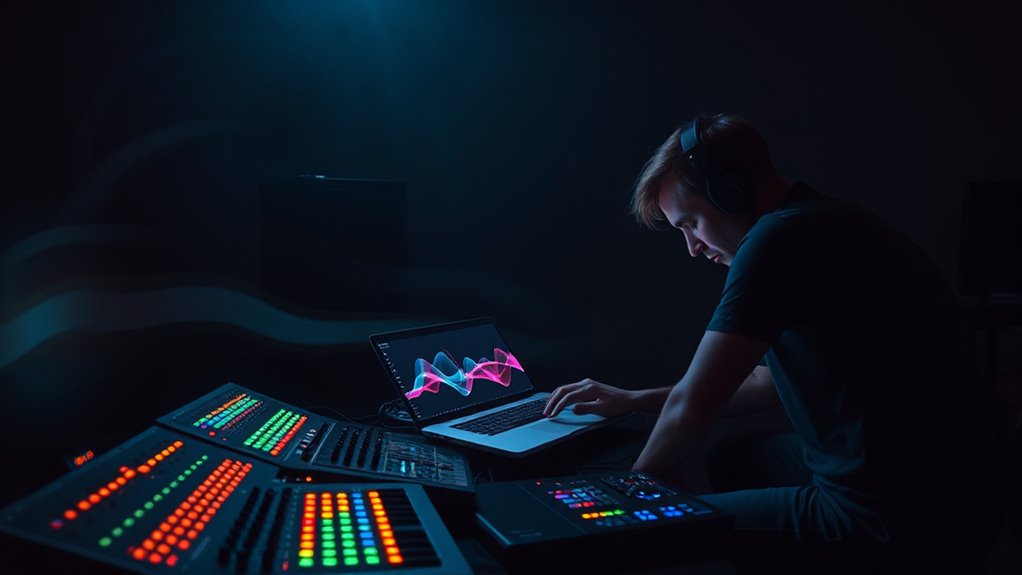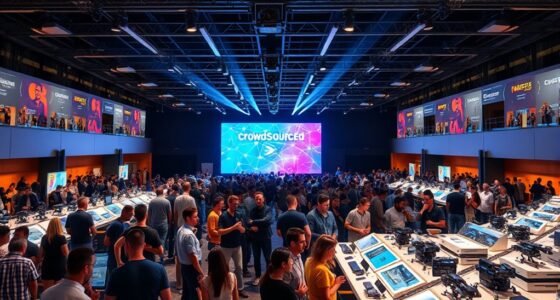Human-AI collaboration is changing music creation. With generative algorithms, you can co-create innovative compositions that blend your ideas with AI’s analytical capabilities. The AI helps you explore new melodies, harmonies, and arrangements, pushing your creative boundaries. It automates technical tasks, allowing you to focus on your artistic vision instead. This partnership amplifies your creativity while opening up exciting possibilities in music production. Stick around to discover how this technology can elevate your musical journey.
Key Takeaways
- AI acts as a co-creator, enhancing human musicians’ compositions with new ideas and suggestions based on initial inputs.
- Generative algorithms analyze musical styles and structures, providing unexpected and innovative outcomes that expand creative possibilities.
- Collaboration with AI streamlines the music-making process, automating technical tasks and allowing artists to focus on artistic expression.
- AI tools identify trends in instrumentation and tempo, serving as experienced collaborators in arrangement and production.
- The partnership between humans and AI amplifies creativity, fostering imagination and innovation in music production for all skill levels.

As technology evolves, the collaboration between humans and artificial intelligence (AI) is reshaping creativity in unprecedented ways. You might find yourself wondering how this partnership can enhance your own creative efforts, especially in the domain of music. With AI collaboration, you’re not just a creator; you’re also a co-creator, working alongside advanced algorithms that can inspire and elevate your compositions.
Imagine sitting down with a generative algorithm that understands various musical styles, harmonies, and rhythms. You can input your initial ideas, and the AI analyzes those elements, providing suggestions that you may not have considered. This is where creative automation comes into play. It streamlines the process of music-making, helping you explore new melodies and chord progressions that can spark your imagination. Rather than feeling overwhelmed by the blank page, you now have a partner that generates possibilities, allowing you to push your creative boundaries.
Collaborate with generative algorithms to transform your musical ideas into innovative compositions, sparking creativity and expanding your artistic horizons.
You may also appreciate how AI tools can assist in areas like arrangement and production. By analyzing vast datasets of music, AI can help you identify trends, making recommendations about instrumentation or tempo. This type of collaboration means you can focus more on the emotional core of your music while leaving the technical aspects to the AI. It’s like having an experienced collaborator who knows the ins and outs of production, letting you concentrate on what truly matters—the art itself.
When you engage with generative algorithms, you’re actively participating in a dialogue between human intuition and machine learning. This synergy can lead to unexpected outcomes, enriching your musical repertoire. You might create a piece that combines genres or employs unconventional structures, all thanks to the AI’s ability to generate ideas based on your input. The result isn’t just a product of technology; it’s a unique blend of your creativity and the AI’s analytical prowess.
As you explore the world of AI collaboration, you’ll find that it’s not about replacing your creative voice but amplifying it. Whether you’re a seasoned musician or a budding composer, harnessing the power of creative automation can open new dimensions in your music. Embrace this partnership, and let your imagination flourish in ways you never thought possible. With AI by your side, the future of music creation is not just bright; it’s a harmonious symphony of human and machine. Additionally, utilizing AI in your creative process can enhance your understanding of color accuracy in sound production, leading to more nuanced audio experiences.
Frequently Asked Questions
How Do Generative Algorithms Learn to Create Music?
Generative algorithms learn to create music through algorithm training using neural networks. You feed them large datasets of existing music, allowing the algorithms to analyze patterns, structures, and styles. The neural networks then adjust their parameters based on this data, enabling them to generate new compositions that mimic the learned characteristics. Over time, as you provide more data and feedback, these algorithms refine their output, resulting in increasingly sophisticated musical creations.
Can Ai-Generated Music Be Copyrighted?
Imagine a painter using a brush to create a masterpiece; similarly, AI crafts music with algorithms. However, when it comes to copyright, things get murky. You can’t simply claim AI-generated music as your own without considering the legal implications. Intellectual property laws vary, and in many cases, the creator of the AI or the user might hold rights. It’s essential to navigate these waters carefully to protect your interests.
What Genres Can AI Compose Music In?
AI can compose music in a variety of genres, showcasing impressive genre versatility. You’ll find it creating everything from classical and jazz to pop, rock, and electronic. Music genre exploration with AI opens up new possibilities, allowing you to encounter unique blends and innovative sounds. Whether you’re looking for a catchy tune or an experimental piece, AI’s adaptive capabilities ensure you’ll discover music that resonates with your preferences and sparks your creativity.
How Do Musicians Collaborate With AI Tools?
Musicians collaborate with AI tools by leveraging AI improvisation to enhance their creative process. You can input melodies or rhythms, allowing the AI to generate unique variations that spark inspiration. This dynamic interplay enables you to explore new emotional expressions in your compositions. By adjusting parameters, you can guide the AI’s output, ensuring it aligns with your artistic vision while creating a rich tapestry of sounds that reflects both your style and the AI’s creativity.
Are There Ethical Concerns With AI Music Creation?
Sure, let’s imagine a world where robots compose symphonies while sipping coffee! But hold on, there are ethical concerns with AI music creation. You’ve got AI bias sneaking in, which could distort diverse musical expressions. Plus, you might wonder about artistic authenticity—can a machine really capture the soul of a song? So, while the idea of AI musicians sounds cool, it raises important questions about creativity and the essence of art.
Conclusion
In the ever-evolving landscape of music creation, your collaboration with generative algorithms opens a treasure chest of endless possibilities. By blending human intuition with AI’s innovative capabilities, you’re not just composing; you’re weaving a rich tapestry of sound that resonates with emotion and creativity. This partnership is a harmonious dance, where technology and artistry intertwine, leading to an extraordinary symphony that challenges traditional boundaries and invites a new era of musical expression.










